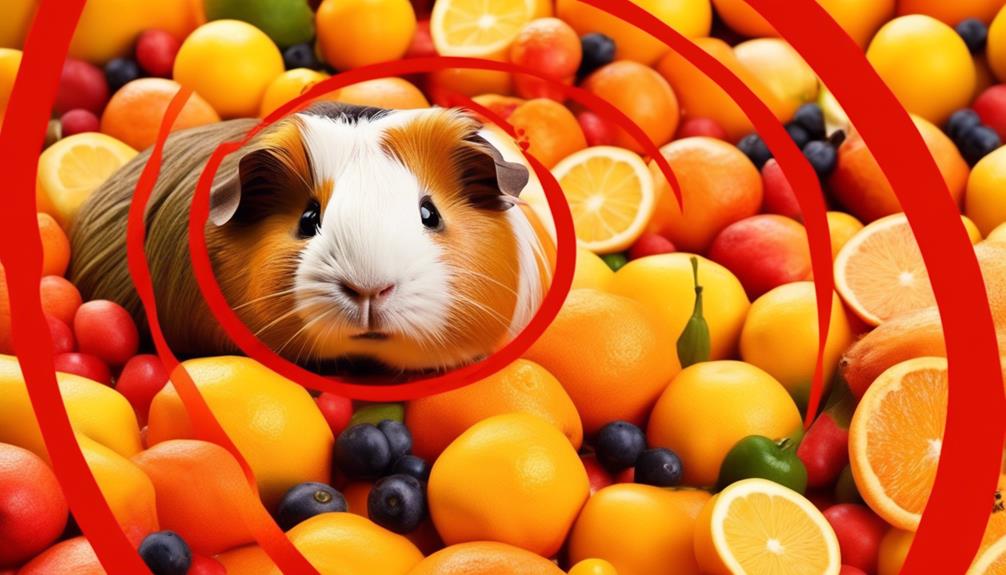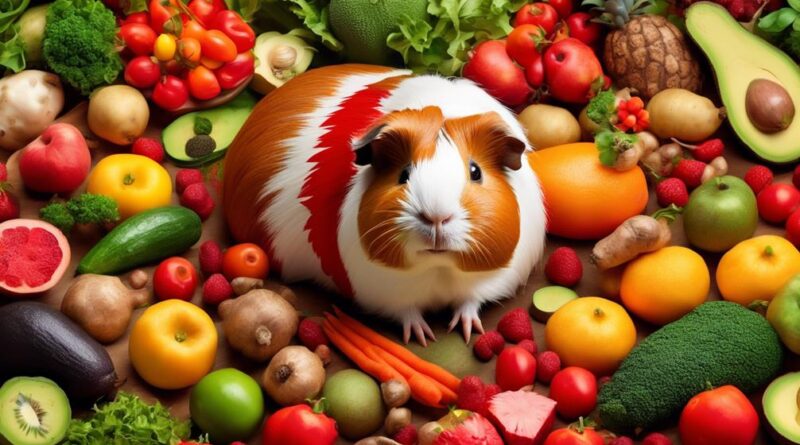How to Avoid Harmful Foods for Guinea Pigs
Imagine your guinea pig happily nibbling on fresh, vibrant greens, their little nose twitching with delight.
Now, imagine the harm that could be caused by unknowingly feeding them foods that are harmful to their delicate digestive systems.
While you may be careful with their diet, there are some common foods that can pose a danger to your furry friend.
But fear not, as we will guide you through the minefield of potentially harmful foods for guinea pigs, ensuring their health and happiness.
Chocolate and Caffeine
Before feeding your guinea pig, be sure to avoid giving them any chocolate or caffeinated products. Chocolate toxicity can be harmful to guinea pigs due to the theobromine content, which they can't metabolize effectively. Even a small amount can lead to severe health issues or even death. Caffeine dangers are also a concern for guinea pigs. Caffeine stimulates their nervous system, leading to rapid heart rate, tremors, and potential seizures. It's crucial to keep all chocolate and caffeinated products out of reach of your guinea pig.
When it comes to chocolate, all forms should be strictly off-limits. This includes dark chocolate, milk chocolate, and even white chocolate. The theobromine in chocolate can cause chocolate toxicity in guinea pigs, leading to symptoms such as diarrhea, vomiting, hyperactivity, and in severe cases, tremors, seizures, and even death. It's essential to be diligent about keeping any chocolate products away from your guinea pig's environment.
Likewise, guinea pigs should never consume any caffeinated products. Caffeine dangers can have serious consequences for these small pets. Even small amounts of caffeine can lead to adverse effects, so it's crucial to ensure that your guinea pig doesn't have access to any caffeinated beverages or foods.
High-Sugar Fruits
Be cautious when offering high-sugar fruits to your guinea pig, as excessive sugar intake can lead to health issues. Guinea pigs are prone to obesity, diabetes, and dental problems if they consume fruits with high sugar content. Fruits such as bananas, grapes, cherries, and mangoes are high in natural sugars and should be given sparingly or avoided altogether. High sugar content in fruits can lead to a rapid increase in blood sugar levels, which may put stress on the pancreas and lead to insulin resistance over time.
Additionally, the high sugar content can contribute to weight gain and dental issues in guinea pigs.
It's important to opt for suitable fruit alternatives with lower sugar content to ensure your guinea pig's health and well-being. Some fruits that are lower in sugar and safe for guinea pigs to consume in moderation include strawberries, raspberries, blueberries, and apple slices (without seeds). These fruits provide essential vitamins and minerals without the risk of causing a spike in blood sugar levels.
Always remember that fruits should be given as occasional treats and not as a primary part of your guinea pig's diet.
Seeds and Nuts
Seeds and nuts can be a tempting snack to offer your guinea pig, but it's important to understand the potential risks associated with these foods. While they do have some nutritional value, they can also pose digestive issues for your pet.
Here are some important points to consider when it comes to seeds and nuts for your guinea pig:
- Nutritional value: Seeds and nuts are high in fat and can be a good source of protein and fiber. However, they also contain a lot of calories, which can lead to obesity in guinea pigs if consumed in large quantities. It's important to offer them in moderation to avoid weight-related health problems.
- Digestive issues: Guinea pigs have sensitive digestive systems, and certain seeds and nuts can be difficult for them to digest. Some seeds, such as apple seeds, contain cyanide compounds that can be toxic to guinea pigs if ingested in large amounts. Additionally, the hard shells of some nuts can be a choking hazard or cause digestive blockages.
When it comes to seeds and nuts, it's best to err on the side of caution. While they can provide some nutritional benefits, the potential for digestive issues and other health risks means that they should only be offered sparingly and in small amounts. Always consult with a veterinarian before introducing any new foods to your guinea pig's diet to ensure their safety and well-being.
Dairy Products
When considering your guinea pig's diet, it's important to be cautious about introducing dairy products, as they can pose potential digestive issues similar to seeds and nuts. Guinea pigs are lactose intolerant, which means they lack the necessary enzymes to digest lactose, the sugar found in dairy products. Feeding your guinea pig dairy products can lead to bloating, gas, diarrhea, and stomach discomfort. It's best to avoid giving them any type of dairy, including milk, cheese, yogurt, or any other dairy-based products.
Furthermore, while dairy products are a good source of calcium for humans, they may not be suitable for guinea pigs due to their high calcium content. Excessive calcium intake can lead to bladder stones or kidney problems in guinea pigs, which can be extremely painful and require veterinary intervention. Therefore, it's crucial to ensure that your guinea pig's diet is balanced and doesn't contain an excess of calcium, which dairy products can contribute to.
Onions and Garlic
Consider avoiding onions and garlic in your guinea pig's diet, as these foods can be harmful to their health. While these ingredients are common in human cooking, they can pose serious risks to your guinea pig due to their potential toxicity and digestive issues.
Here are three reasons why onions and garlic should be kept out of your guinea pig's diet:
- Toxicity Risks: Onions and garlic contain compounds that can cause oxidative damage to your guinea pig's red blood cells, leading to a condition called hemolytic anemia. This can result in symptoms such as weakness, lethargy, and loss of appetite. In severe cases, it can even be fatal to your pet.
- Digestive Issues: Both onions and garlic can cause digestive upset in guinea pigs. These foods contain substances that can irritate the gastrointestinal tract and disrupt the natural balance of bacteria in the gut. This can lead to symptoms such as diarrhea, abdominal pain, and discomfort for your guinea pig.
- Avoiding Risks: To ensure the well-being of your guinea pig, it's essential to steer clear of feeding them any foods that contain onions or garlic. Be vigilant when preparing fresh vegetables or browsing through commercial guinea pig food ingredients to prevent accidental ingestion of these harmful substances.
Processed Foods
Processed foods can pose potential health risks to your guinea pig, so it's important to be mindful of their inclusion in your pet's diet. When it comes to processed foods, it's essential to steer clear of items that contain food coloring additives, preservatives, artificial sweeteners, and high sodium levels. These additives and preservatives are often included in processed foods to enhance flavor and prolong shelf life, but they can have adverse effects on your guinea pig's health.
Food coloring additives and preservatives, such as BHA, BHT, and ethoxyquin, are commonly found in processed foods and have been linked to various health issues in guinea pigs. These substances can potentially lead to allergic reactions, digestive problems, and even organ damage. Furthermore, artificial sweeteners like xylitol and high levels of sodium can also be harmful to your guinea pig's well-being.
In order to safeguard your guinea pig's health, it's imperative to carefully read the ingredient labels of any processed foods before offering them to your pet. Opt for natural and fresh foods whenever possible, and avoid processed snacks and treats that contain these harmful additives.
Citrus Fruits

Citrus fruits can be a tempting choice for your guinea pig, but it's important to be aware of their potential risks to your pet's health. While guinea pigs can consume small amounts of citrus fruits, the high acidity and sugar content in these fruits can lead to digestive issues and other health problems. Here are some important things to consider when it comes to feeding citrus fruits to your guinea pig:
- Citrus fruit alternatives: Instead of offering citrus fruits to your guinea pig, consider providing safer alternatives such as bell peppers, strawberries, kiwi, and other guinea pig-friendly fruits and vegetables. These alternatives are lower in acidity and sugar, reducing the risk of digestive upset and other health issues in your pet.
- Citrus fruit portion control: If you do choose to feed your guinea pig citrus fruits, it's crucial to do so in moderation. Limit the portion size to a small piece, about the size of your guinea pig's mouth, and only offer citrus fruits occasionally as a treat. Overfeeding citrus fruits can disrupt your guinea pig's digestive system and lead to discomfort and potential health complications.
Unsafe Vegetables
What vegetables should you avoid feeding to your guinea pig to prevent potential health risks? It's crucial to be aware of the unsafe vegetables that can pose a threat to your guinea pig's well-being. Some vegetables should be avoided as they can cause digestive issues, toxicity, or other health problems for your pet. Avoid feeding your guinea pig vegetables such as onions, garlic, potatoes, and rhubarb as they can be harmful. These vegetables contain compounds that are toxic to guinea pigs and can lead to serious health issues.
When considering safe greens for your guinea pig, it's important to provide a variety of options. Safe greens that you can include in your guinea pig's diet are romaine lettuce, green leaf lettuce, red leaf lettuce, and butterhead lettuce. Other options include cilantro, parsley, dill, and watercress. Always ensure that the greens are thoroughly washed to remove any pesticides or contaminants before offering them to your guinea pig.
In addition to selecting safe greens, it's essential to pay attention to proper portion sizes. While vegetables are an important part of a guinea pig's diet, they should be given in moderation. Overfeeding vegetables can lead to gastrointestinal issues and obesity in guinea pigs. Offer a variety of vegetables in small amounts and monitor how your guinea pig responds to each type of vegetable to ensure they tolerate them well.
Frequently Asked Questions
Can Guinea Pigs Eat Avocado?
Yes, guinea pigs cannot eat avocado due to its potential dangers. Instead, offer safe fruit alternatives like apples, bananas, or strawberries. Always prioritize your guinea pig's health by avoiding harmful foods and providing suitable alternatives.
Are There Any Specific Vegetables That Guinea Pigs Should Avoid?
When it comes to guinea pig diet restrictions, there are certain vegetable restrictions you should keep in mind. Some veggies like onions, garlic, and potatoes can be harmful, so it's important to avoid those.
Can Guinea Pigs Eat Bread or Other Baked Goods?
Yes, guinea pigs can eat bread in moderation, but it's not an essential part of their diet. While it's okay as an occasional treat, focus on providing them with fresh hay, vegetables, and pellets for balanced nutrition.
Is It Okay for Guinea Pigs to Consume Mushrooms?
Yes, guinea pigs can eat mushrooms, but be cautious. Stick to safe varieties like button or portobello. Mushrooms offer nutritional benefits like vitamins and fiber, but always monitor your guinea pig's preferences and any potential digestive issues.
Are There Any Specific Herbs That Guinea Pigs Should Avoid?
You should avoid giving guinea pigs toxic plants or dangerous herbs. These can be harmful to their health. Stick to safe options like parsley, cilantro, and basil. Always research before introducing new foods to their diet.
Conclusion
In conclusion, it's important to avoid feeding your guinea pig harmful foods like chocolate, caffeine, high-sugar fruits, seeds, nuts, dairy products, onions, garlic, processed foods, and citrus fruits. Stick to safe vegetables and a balanced diet to keep your furry friend healthy and happy.
Remember, their dietary needs are different from ours, so always do your research and consult with a veterinarian if you have any questions about what to feed your guinea pig.
